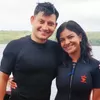
A lagoon is a shallow body of water protected from a larger body of water (usually the ocean) by sandbars, barrier islands, or coral reefs. When coral reefs protect a lagoon, it’s called an Atoll Lagoon, which is very common in the tropical waters of the South Pacific and Indian Oceans. The water of atoll lagoons is often a striking light blue due to its shallow depth and interaction with limestone. The billion-dollar tourism industry of the Maldives relies on atoll lagoons. These are also the site of some of the most intense debates about climate change and sea-level rise. The Maldives is home to many extraordinary atoll islands on the planet. Its closest neighbors are Sri Lanka and another group of atoll islands called Lakshadweep, India!
Lakshadweep is an Indian Union Territory comprising 36 islands. Kavaratti serves as the capital of the Union Territory. The 10 inhabited islands of Lakshadweep are Kavaratti, Agatti, Amini, Kadmat, Kiltan, Chetlat, Bitra, Andrott, Kalpeni, and Minicoy. Both Lakshadweep and Maldives are a part of the Chagos-Laccadive Plateau. Given its geographical positioning, Lakshadweep can offer you as much as the Maldives, perhaps, even a little more.

Imagine yourself walking on the beach of a secluded island with pearlescent white sand and turquoise blue water. You notice stingrays in the calm water and start filming them (while trying to keep up to their pace). Next, you see a sandbank within walking distance from the beach! This side of the beach has shallow water. After spending some time there, you head back to the beach. A five-minute walk through the coconut tree plantation takes you to the other side of the beach with deeper water and coral reefs approximately 3 meters away from the shore. This stretch is an abode to tigerfish, pufferfish, clownfish, octopus, and sea turtles! In addition, it is a Bioluminescent beach! Welcome to the coral garden of Lakshadweep - The Bangaram Island.

How To Reach Bangaram/Lakshadweep
For all tourist purposes, Kochi is the gateway to Lakshadweep. Indian Airlines flies exclusively between Kochi and Agatti, the only airstrip in Lakshadweep. The flight duration is around 90 minutes with limited capacity. Boat transfers are available from Agatti to Bangaram, Kavaratti, and Kadmat Islands.
Seven passenger ships – MV Kavaratti, MV Arabian Sea, MV Lakshadweep Sea, MV Lagoon, MV Corals, MV Amindivi, and MV Minicoy operate between Cochin and Lakshadweep islands.
The Society for Promotion of Nature Tourism and Sports (SPORTS)
The Society operates tourist resorts at Bangaram, Thinnakara, Kadmat, Minicoy, and Kavaratti. It also conducts ship package tours covering three islands - Minicoy, Kalpeni, and Kavaratti or Kadmat. The Lakshadweep Samudram Package is a five-day cruise to Kavaratti, Kalpeni, and Minicoy. You can also opt for land packages directly from SPORTS or SPORTS authorized Travel Agents (Link: http://lakshadweeptourism.com/agents.html).
Kindly note that every person, who is not a native of Lakshadweep, shall have to obtain a permit before entering and living in Lakshadweep. Please check with your travel agent for details. The number of tourists allowed to enter the islands is limited.

Bangaram Resort
Undoubtedly, Bangaram Resort is one of the friendliest, cleanest, greenest, and luxurious (partially Government-owned) Guest Houses I have lived in. They have 29 spacious tourist cottages and 4 executive cottages with a Water Sports and Scuba Dive Center. The resort serves Breakfast/Lunch/Snack/Dinner Buffets and is the only resort to serve alcohol in Lakshadweep.

Bangaram Atoll and Bangaram Island
White sand, turquoise blue water, beautiful beaches, and lush green forests, these words cannot justify the beauty of Bangaram Atoll and its islands. One does not need an Instagram filter or any other photo-editing tool here. Bangaram is the largest island in the atoll followed by Thinnakara and Parali.
Thinnakara and Parali beaches are nesting beaches. The lagoon is home to many Green and Hawksbill Turtles. Day trips to Thinnakara and Parali Islands may give you a chance to swim with sea turtles! We also saw Moray Eel and Puffer Fish in the nearby shipwreck snorkeling spot!

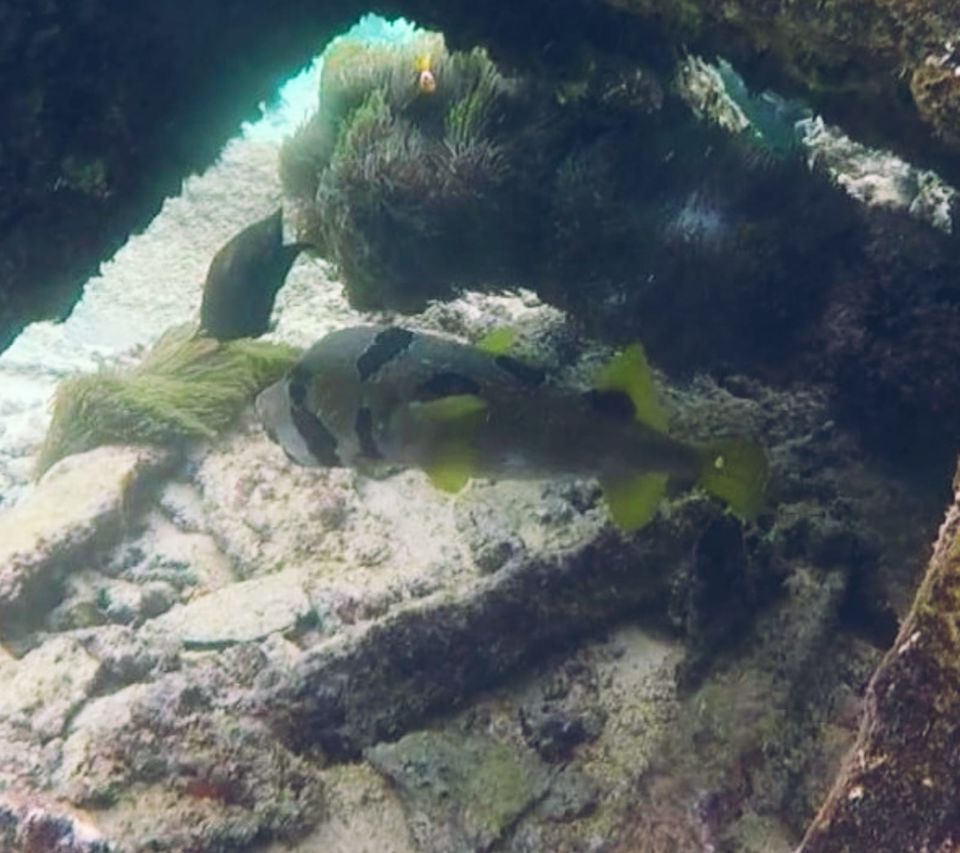
Soft sand, ample sunshine, a swimming/snorkeling/diving side for the water babies, and a shallow side with a sandbank for the sunset lovers define Bangaram Island! We have seen 50 shades of every color you can imagine in Bangaram.
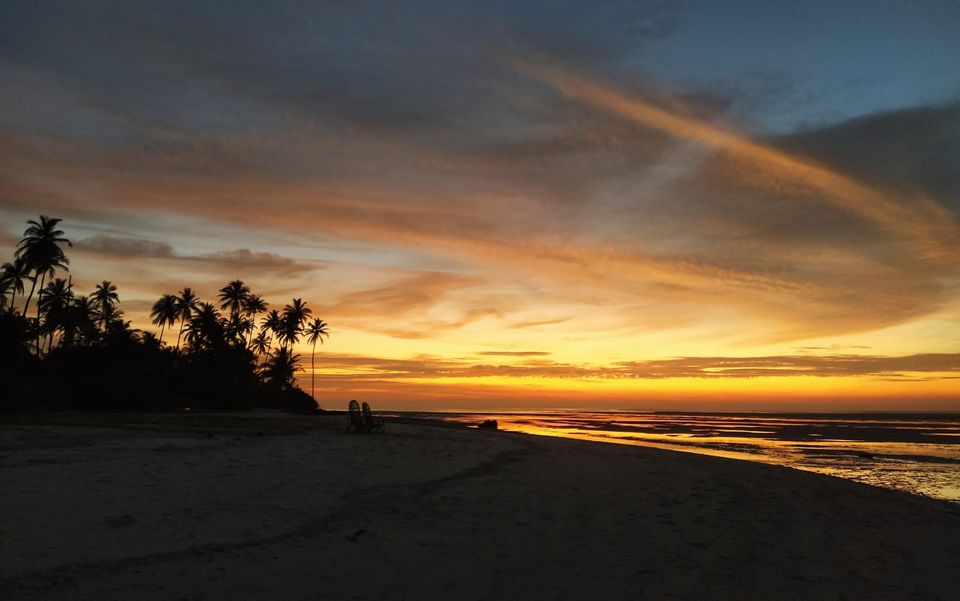
Another highlight of the island is the snorkeling trip to Coral Garden. Do not skip this, I repeat, do not skip the Coral Garden snorkeling trip at Bangaram. So far, Coral Garden is the healthiest coral reef we have seen with Giant Clams, Sea Cucumbers, StarFish, Touch Me Nots, Algae, Seagrasses, Seaweeds, etc. The lagoon is crystal-clear with excellent water visibility even during sunset and cloudy weather. Moreover, pay a visit to the western side of the island after sunset because Bangaram beach is a bioluminescent beach! A pod of playful dolphins paid us a visit on our last day at Bangaram. The perfect way to end the holiday!
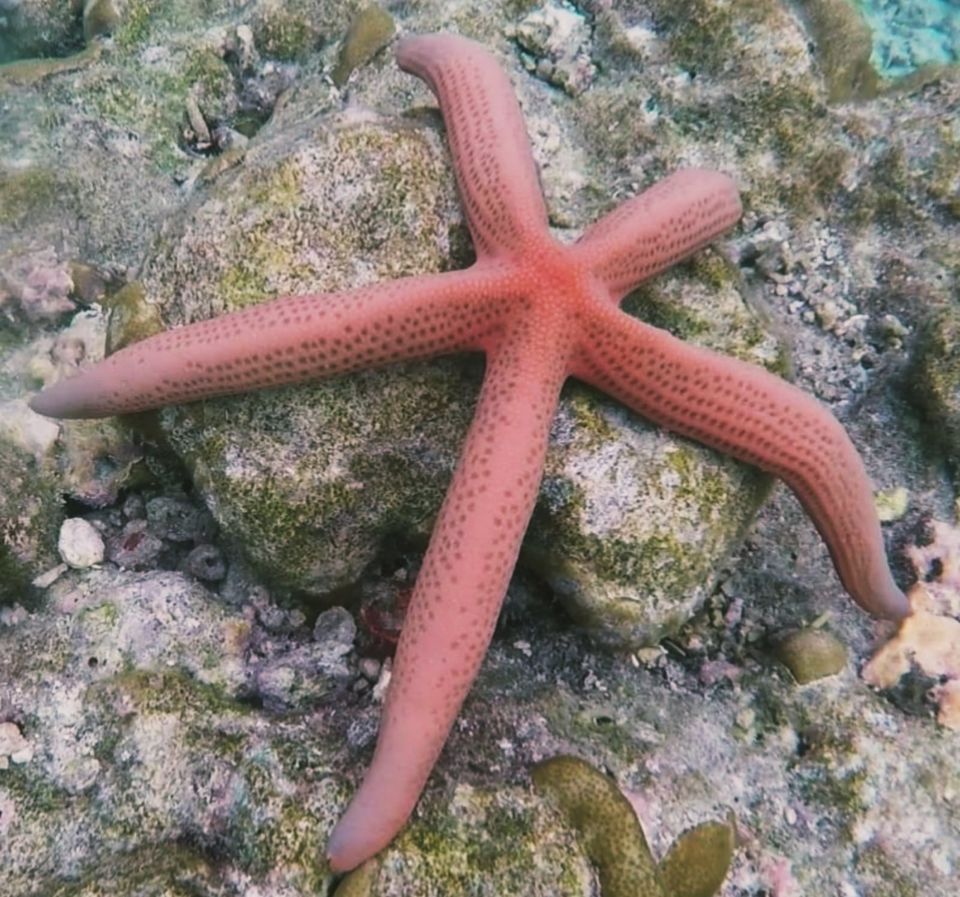
Now, let me come to the best part of the island, its PEOPLE. This is a true story – Our mobile network provider, Vodafone, does not work in Lakshadweep. A localité let us use his sim during our stay. Our accommodation, meals, and flight tickets were pre-paid. However, we still had to pay for the island trips and water activities. The resort does not accept cards and our G-Pay will not work! The General Manager of the resort, another localité, paid our bill and told us to return the money whenever possible! Owning to the pandemic and administrative changes in the Union Territory, the staff are overworked and underpaid, but we have never seen them without a smile on their face. Their minimalist lifestyle includes fishing rods, essential kitchen utensils, few clothes, and profuse humbleness. A special shout-out to the Water Sports Center, Dive Center, and Kitchen staff for their commitment towards the guests.
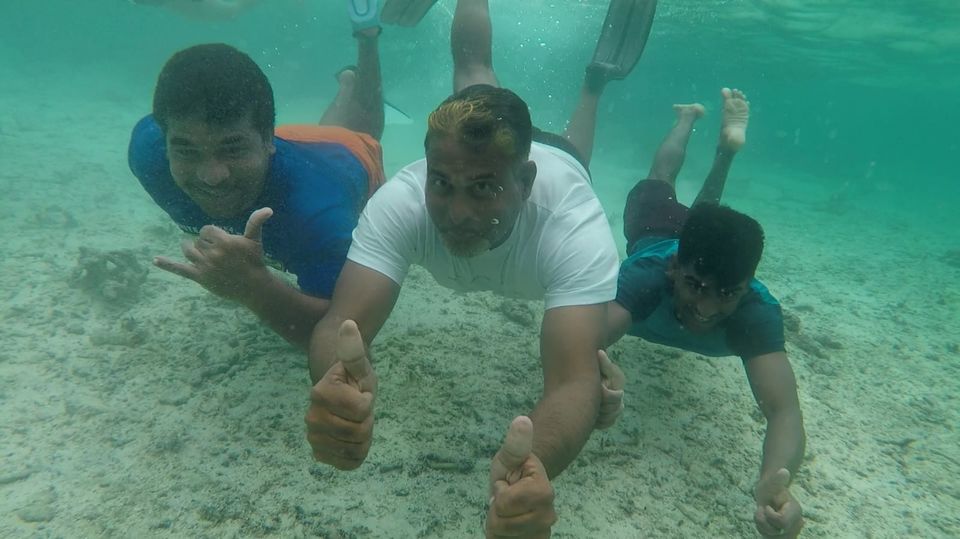
The traditional sources of income for the people of Lakshadweep continue to be fishing and tourism. The reef bio-composition of Lakshadweep includes more than 100 species of corals, 4 species of lobsters, 600 species of finfishes, 7 species of seagrasses, etc. The calm, warm water around coral reefs is a mating habitat for fish and other sea creatures. The reefs are also a potential tourist attraction providing a steady flow of income to the islanders through responsible fisheries and tourism. Sadly, the Lakshadweep Islands and its Reefs are in danger.

Global Warming is an aspect of climate change leading to the increased concentrations of greenhouse gases in the atmosphere, increasing sea surface temperatures, and rising sea levels. Rapid warming in the Arabian Sea has increased the number of cyclones by 50% in the basin. In addition, oceans store a large amount of carbon dioxide and help reduce climate change. However, an increase in the levels of dissolved carbon is making the oceans acidic and affecting coral reefs and marine life negatively.
Rising sea levels may submerge the Maldives by 2100. Parali 1 Island of the Bangaram Atoll has already sunk and no longer exists due to coastal erosions. Apart from Parali I, net erosion was highest in Parali II (80 per cent), followed by Thinnakara (14.38 per cent), Parali III (11.42 per cent) and Bangaram (9.97 per cent).
The Lakshadweep administration is going ahead with its controversial tourism plans of building 370 water bungalows, ignoring warnings from scientists. Marine biologists fear that this development may pollute large areas of the lagoon and its ecosystem. The proposed large-scale human interventions would aggravate climate change-related disasters in the coming days.
Coral reefs protect coastlines from storms, erosion and provide jobs for local communities. For centuries, the corals have provided livelihoods and a perfect ecosystem for the people of Lakshadweep. The islanders lived in harmony with nature and sustained without dreamy beach bungalows and high-end tourism. Fishing, diving, and snorkeling on and near reefs is already an established business in Lakshadweep. If the islanders lose their coral reefs, they lose their source of food, income, and protection. Lakshadweep deserves development, but the developmental vision should respect its ecology, understand and celebrate its deep cultural history and empower the islanders.

We have been to a couple of luxurious holiday destinations around the world. However, we saw bioluminescent algae for the first time at Bangaram beach. We were in paradise. Beneath a sky full of stars and above soft white sand, witnessing the shore bleed blue! At that moment, I told myself, I wish I could stop time and never go back to my cottage! I would have felt the same way even if I were living in a water bungalow!
For updates on our travel adventure, follow us on Instagram (dishari_palit). DM us and don't shy away from sharing your feedback, queries or just drop in to say HELLO! You can click on the links below to watch our videos on Lakshadweep:
https://www.instagram.com/reel/CWgMUypFNl8/?utm_medium=copy_link
https://www.instagram.com/reel/CWVWYsmgnMwHZUrfWSB0EyonDgshrynY6Wh3d00/?utm_medium=copy_link
Frequent searches leading to this page:-

